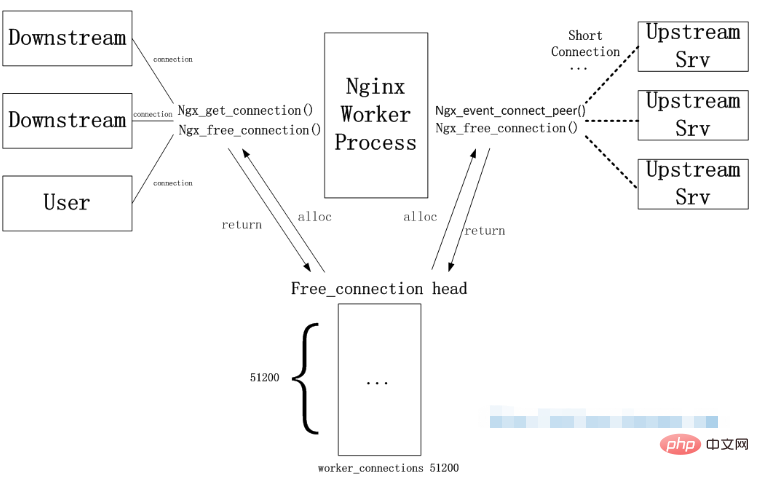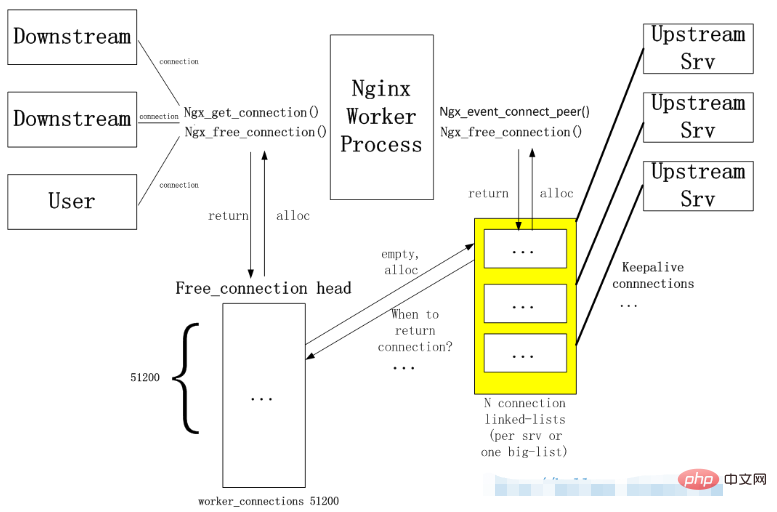
前言
nginx upstream与后端的连接默认为短连接,通过http/1.0向后端发起连接,并把请求的"connection" header设为"close"。nginx与前端的连接默认为长连接,一个用户跟nginx建立连接之后,通过这个长连接发送多个请求。如果nginx只是作为reverse proxy的话,可能一个用户连接就需要多个向后端的短连接。如果后端的服务器(源站或是缓存服务器)处理并发连接能力不强的话,就可能导致瓶颈的出现。
nginx目前的upstream连接建立和获取的机制如下图。nginx会在一开始创建connection pool(进程间不共享,可以避免锁),提供给所有向前/后的连接。

如果要实现upstream长连接,则每个进程需要另外一个connection pool,里面都是长连接。一旦与后端服务器建立连接,则在当前请求连接结束之后不会立即关闭连接,而是把用完的连接保存在一个keepalive connection pool里面,以后每次需要建立向后连接的时候,只需要从这个连接池里面找,如果找到合适的连接的话,就可以直接来用这个连接,不需要重新创建socket或者发起connect()。这样既省下建立连接时三次握手的时间消耗,又可以避免tcp连接的slow start。如果在keepalive连接池找不到合适的连接,那就按照原来的步骤重新建立连接。假设连接查找时间可以忽略不计,那么这种方法肯定是有益而无害的(当然,需要少量额外的内存)。

具体如何来设计这个keepalive connection pool,不同人有不同的选择。比如nginx目前的第三方模块upstream keepalive(作者maxim dounin)使用了一个queue来做。因为upstream的服务器很可能是多个,所以可能当保持的连接数多的时候,查找的时间可能会较长。可以给每个upstream服务器都分配一个pool(queue),缩短查找时间。但是总体来说内存操作很快,影响不会很大。upstream keepalive模块目前只支持memcached,但是可以重用其代码来达到对http upstream的长连接。由于nginx作者之前没有考虑upstream的长连接,所以在设计上要把http upstream keepalive模块化可能比较难,只能通过手动修改代码来做到。
一个完整的让upstream支持长连接的配置示例如下:
#user nobody;
worker_processes 1;
#error_log logs/error.log;
#error_log logs/error.log notice;
#error_log logs/error.log info;
#pid logs/nginx.pid;
events {
worker_connections 1024;
}
http {
include mime.types;
default_type application/octet-stream;
#log_format main '$remote_addr - $remote_user [$time_local] "$request" '
# '$status $body_bytes_sent "$http_referer" '
# '"$http_user_agent" "$http_x_forwarded_for"';
#access_log logs/access.log main;
client_max_body_size 20m;
client_header_buffer_size 32k;
large_client_header_buffers 4 32k;
sendfile on;
#tcp_nopush on;
#keepalive_timeout 0;
keepalive_timeout 65;
#gzip on;
proxy_buffer_size 64k;
proxy_buffers 32 32k;
proxy_busy_buffers_size 128k;
upstream aaucfg_backend {
server 127.0.0.1:97;
keepalive 16;
}
upstream hfc_backend {
server 127.0.0.1:8090;
keepalive 16;
}
upstream manager_backend {
server 127.0.0.1:8095;
keepalive 16;
}
server {
listen 80;
server_name localhost;
#charset koi8-r;
#access_log logs/host.access.log main;
root html/tools;
index index.html index.htm index.php;
proxy_http_version 1.1;
proxy_set_header connection "";
proxy_set_header host $host;
proxy_set_header x-real_ip $remote_addr;
proxy_set_header x-forwarded-for $proxy_add_x_forwarded_for;
location / {
if (!-e $request_filename) {
#rewrite ^/(.*)$ /index.php/$1 last;
#break;
rewrite ^/(.*)$ /index.php/$1;
}
}
location ~* \.(ico|css|js|gif|jpe?g|png)(\?[0-9]+)?$ {
expires max;
log_not_found off;
}
location ^~ /aaucfg/ {
#proxy_pass http://$remote_addr:97$request_uri;
proxy_pass http://aaucfg_backend;
}
location ^~ /hfc/ {
#proxy_pass http://$remote_addr:8090$request_uri;
proxy_pass http://hfc_backend;
}
location ^~ /manager/ {
#proxy_pass http://$remote_addr:8095$request_uri;
proxy_pass http://manager_backend;
}
#error_page 404 /404.html;
# redirect server error pages to the static page /50x.html
#
error_page 500 502 503 504 /50x.html;
location = /50x.html {
root html;
}
# proxy the php scripts to apache listening on 127.0.0.1:80
#
#location ~ \.php$ {
# proxy_pass http://127.0.0.1;
#}
# pass the php scripts to fastcgi server listening on 127.0.0.1:9000
#
#location ~ \.php$ {
# fastcgi_pass 127.0.0.1:9000;
# fastcgi_index index.php;
# fastcgi_param script_filename $document_root$fastcgi_script_name;
# include fastcgi_params;
#}
location ~ .php
{
fastcgi_pass 127.0.0.1:9000;
fastcgi_index index.php;
fastcgi_param script_filename $document_root$fastcgi_script_name;
include fastcgi.conf;
include fastcgi_params;
#定义变量 $path_info ,用于存放pathinfo信息
set $path_info "";
#定义变量 $real_script_name,用于存放真实地址
set $real_script_name $fastcgi_script_name;
#如果地址与引号内的正则表达式匹配
if ($fastcgi_script_name ~ "^(.+?\.php)(/.+)$") {
#将文件地址赋值给变量 $real_script_name
set $real_script_name $1;
#将文件地址后的参数赋值给变量 $path_info
set $path_info $2;
}
#配置fastcgi的一些参数
fastcgi_param script_filename $document_root$real_script_name;
fastcgi_param script_name $real_script_name;
fastcgi_param path_info $path_info;
}
# deny access to .htaccess files, if apache's document root
# concurs with nginx's one
#
#location ~ /\.ht {
# deny all;
#}
}
# another virtual host using mix of ip-, name-, and port-based configuration
#
#server {
# listen 8000;
# listen somename:8080;
# server_name somename alias another.alias;
# location / {
# root html;
# index index.html index.htm;
# }
#}
# https server
#
#server {
# listen 443 ssl;
# server_name localhost;
# ssl_certificate cert.pem;
# ssl_certificate_key cert.key;
# ssl_session_cache shared:ssl:1m;
# ssl_session_timeout 5m;
# ssl_ciphers high:!anull:!md5;
# ssl_prefer_server_ciphers on;
# location / {
# root html;
# index index.html index.htm;
# }
#}
}Atas ialah kandungan terperinci Bagaimana untuk melaksanakan proksi terbalik Nginx untuk menyokong sambungan yang panjang. Untuk maklumat lanjut, sila ikut artikel berkaitan lain di laman web China PHP!
 nginx mulakan semula
nginx mulakan semula
 Penjelasan terperinci tentang konfigurasi nginx
Penjelasan terperinci tentang konfigurasi nginx
 Penjelasan terperinci tentang konfigurasi nginx
Penjelasan terperinci tentang konfigurasi nginx
 Apakah perbezaan antara tomcat dan nginx
Apakah perbezaan antara tomcat dan nginx
 penggunaan propertydescriptor
penggunaan propertydescriptor
 Bagaimana untuk mengaktifkan tingkap komputer
Bagaimana untuk mengaktifkan tingkap komputer
 Bagaimana untuk mengikat data dalam senarai lungsur
Bagaimana untuk mengikat data dalam senarai lungsur
 Apakah parameter konfigurasi pelayan video?
Apakah parameter konfigurasi pelayan video?
 Apakah pernyataan kawalan aliran java?
Apakah pernyataan kawalan aliran java?




